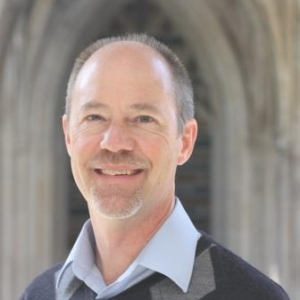“One thing that hasn’t changed about Duke,” Jeff Biddle says as we make our way across West Campus to the Social Sciences Building, “is the squirrels. They’re as plentiful as ever! Not as fat as the squirrels in Michigan. They get scrawnier as you get further south, you know.”
The 2013-14 HOPE Center fellow has some reliable points of reference. A professor of economics at Michigan State University and a native of West Virginia, Jeff earned his PhD from Duke in 1985 and in 1994-95 spent a year here as a visiting faculty member in the economics department.
But if the squirrels haven’t changed, the campus, Jeff quickly points out, has.
“The first thing I’ve noticed in coming back to Duke is the physical growth of the university—all the new buildings.” And Duke “handles it well,” he says: “The university has managed to keep the look of the main quad even though all these new buildings have been constructed.”
Of course, Jeff’s main concerns during his fellowship are not the campus wildlife or architecture—as beguiling as those might be.
While at the HOPE Center, Jeff will be finishing a book on the introduction and spread of the production function regression as a research tool in economics over the years 1927-1970. He will be revising and sharpening the arguments in chapters he has already written, and drafting interpretive chapters offering thoughts on what can be learned from the history of the Cobb-Douglas regression.
A key question he wants to answer is how the production function regression, which started as an innovative but quite controversial statistical procedure, became a widely accepted, general-purpose tool in empirical economics.
An avid cyclist who loves the outdoors, Jeff is living with his wife in an apartment building on land that used to be part of Duke Forest.
They furnished their apartment themselves by shopping at local thrift stores.
“That was a fun activity in itself,” says Jeff, who is a member of HOPE’s advisory board and was a co-organizer of a 1999 HOPE conference on applied economics.
One of the first things Jeff did after arriving in Durham was to join the local cycling club. And when the weather gets warmer, Jeff and his wife hope to kayak on the area lakes.
The most important thing about being here, Jeff says, is having a community of historians of economics with whom to engage. Between the faculty, the other fellows, and the visitors, there’s a nice range of scholars at different stages of their careers and pursuing interesting and varied research projects—all dealing with some aspect of the history of economics.
“That’s what makes Duke unlike any other place,” Jeff says.
--Paul Dudenhefer
